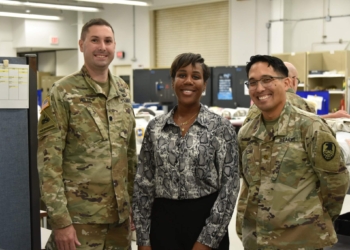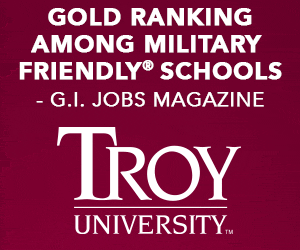Education programs continue to be an attractive benefit of enlistment, with each service branch extending some variation of tuition assistance to its personnel. But adding a course load to a full-time work schedule requires planning and commitment. The rigors of the daily mission can make obtaining a college or higher education-level degree more difficult, but it can be done with a few organizational tips and time management skills.
A post-secondary degree has been known to aid in career promotions for service members, and it is a qualifier for all enlisted to officer programs. In addition, it can help increase job opportunities for those who transition out.
The 2019 findings from the National Center for Education Statistics concur. According to its report, those ages 34 to 44 — the ages of many service members post-retirement — who have a college degree or higher, have an 87.9% employment rate compared to those who have high school level education, which holds a 74.6% employment rate.
Army Staff Sgt. Ulisses Bautista started working towards his college degree while on tour in Korea at the age of 34.
“I started college because I wanted to do something that would benefit me while I was in the military. I was also thinking about retirement, and having my degree will give me a head start for job searching once I retire,” Bautista said.
Since he began, he has achieved his associate degree and is now pursuing a bachelor’s degree.
“For me, starting was the hardest part. Once you’re in the groove, it becomes easier, especially if you’re doing something you love, which I am,” he said.
Bautista suggests considering three factors when starting school:
- Is my program of interest available locally or virtually?
- Will my benefits cover the costs of the program?
- What type of scheduling flexibility will I need while attending classes?
Service members can also speak with the base education center about academic options like onsite learning versus virtual, program terms, and tuition benefits.
Tips for balancing education and active-duty service
Army Sgt. 1st Class Steven Alwine is currently studying for his Bachelor of Art in marketing from American Military University. His course load is full time and fully virtual.
Like many service members, Alwine is not only working toward furthering his current career, but he is also looking forward to post-military options. He said with his degree in marketing, he will not only be able to apply the skills he learns for a future marketing career, but he will learn skills that he can apply while on active-duty service.
“The fields overlap with other elements of personnel management, sociology, and understanding of people individually and in groups,” he said.
But balancing active-duty service, classes, and home life is no easy feat. Alwine suggests that the first step is to be transparent with your spouse and your family about how much time classes will require in addition to the service member’s daily mission.
“Plan for how to space out school requirements throughout the week so you aren’t spending your whole weekend trying to do schoolwork. … If possible, coordinate with your chain of command to provide some time during the week to get… schoolwork done,” Alwine suggested.
In addition, having a plan in place and deadlines in mind are crucial to ensuring there is an equal amount of time spent on work, school, and with family.
“Take breaks from school, but know when deadlines are approaching. [And] make… plans for content so if you do have to take a break it is easier to return to a paper or lab,” he said.
Other tips for managing time:
- Be clear with family about your school schedule
- Make a plan for taking breaks
- Plan to do your coursework during the week at a set time
- Consult with your command about taking time for schoolwork
- Find a support group to keep you motivated, like Student Veterans of America
In the end, Bautista and Alwine said pursuing a higher education degree while in uniform is worth it, even if it requires extra planning. Benefits like tuition assistance and rallying supporters in the form of friends, family, and colleagues can help tremendously.
Alwine’s biggest advice: find your support group.
“[Speak with] the enlisted people who got degrees on active duty for how to manage time, or even a sympathetic ear who will keep you moving towards completion. It’s a hard road, but it’s worthwhile.”













































